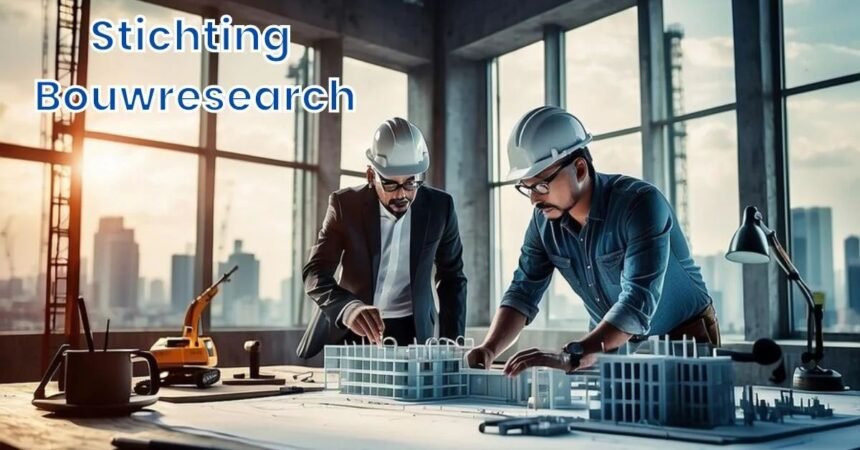Introduction
The construction industry is constantly evolving, driven by new technologies, innovative designs, and evolving sustainability standards. Within this dynamic landscape, organizations like Stichting Bouwresearch play a pivotal role in shaping the future of construction through research, data collection, and insightful analysis. Established as a cornerstone of construction research, Stichting Bouwresearch focuses on providing valuable information that helps industry professionals make informed decisions.
In this article, we will delve into the significance of Stichting Bouwresearch, exploring its key concepts, importance, and applications. We will also examine its impact on the construction industry, discuss the challenges it faces, and highlight its contributions through real-world examples. Whether you are a construction professional, a researcher, or simply interested in the field, this comprehensive guide will provide you with valuable insights into the world of Stichting Bouwresearch.
Detailed Explanation of Key Concepts Of Stichting Bouwresearch
What is Stichting Bouwresearch?
Stichting Bouwresearch, often abbreviated as SBR, is a Dutch foundation dedicated to research and development in the construction industry. It aims to advance the construction sector by producing high-quality research reports, guidelines, and best practices that assist architects, engineers, contractors, and policymakers. The foundation’s work covers various aspects of construction, including building materials, techniques, safety standards, sustainability, and innovation.
Core Objectives of Stichting Bouwresearch
- Promoting Sustainable Building Practices: SBR emphasizes the importance of environmentally friendly construction methods, aiming to reduce the industry’s carbon footprint.
- Enhancing Construction Quality and Safety: By researching new materials and construction methods, SBR helps improve building quality and workplace safety.
- Innovating Building Design and Techniques: The foundation supports the development of innovative solutions that make construction more efficient and cost-effective.
- Providing Educational Resources: SBR offers educational materials, workshops, and seminars to keep industry professionals informed about the latest trends and regulations.
Key Services and Offerings
- Research Publications: SBR publishes research reports that cover various construction topics, from new building codes to innovative technologies.
- Guidelines and Best Practices: The foundation creates comprehensive guides that set the standard for industry best practices.
- Training and Workshops: SBR provides training sessions designed to educate professionals on the latest industry developments.
Importance and Benefits of Stichting Bouwresearch
Why is Stichting Bouwresearch Important?
Stichting Bouwresearch plays a crucial role in bridging the gap between theoretical research and practical application within the construction industry. By focusing on data-driven insights, SBR helps drive improvements in construction quality, sustainability, and safety. Its work benefits a wide range of stakeholders, including architects, engineers, contractors, and regulators.
Key Benefits of Stichting Bouwresearch
- Enhanced Industry Standards: SBR’s guidelines help establish higher standards in construction, ensuring that buildings are safer, more durable, and energy-efficient.
- Support for Innovation: The foundation’s research fosters innovation by identifying new materials and technologies that can revolutionize the construction process.
- Sustainability Leadership: SBR’s focus on sustainable building practices promotes environmental stewardship, encouraging the industry to adopt greener solutions.
- Educational Outreach: Through its educational programs, SBR helps upskill construction professionals, ensuring they remain current with the latest industry standards and technologies.
- Improved Decision-Making: The data and insights provided by SBR empower stakeholders to make informed decisions that lead to better project outcomes.
Real-World Impact
SBR’s influence can be seen in numerous construction projects where its guidelines have been implemented to improve efficiency, reduce waste, and enhance safety. By providing a solid foundation of research, SBR supports the industry’s ongoing quest for innovation and excellence.
Applications and Use Cases: How Stichting Bouwresearch Shapes the Industry
Practical Applications of Stichting Bouwresearch
- Sustainable Building Projects: SBR’s research on sustainable materials and energy-efficient design principles has been widely adopted in green building projects across the Netherlands.
- Quality Assurance in Construction: Construction companies utilize SBR’s guidelines to enhance quality control measures. Ensuring that projects meet both safety and performance standards.
- Urban Development: SBR plays a key role in urban planning by offering insights into sustainable city design. Which balances infrastructure development with environmental preservation.
- Innovative Building Techniques: The foundation’s research into modern construction techniques, such as modular building and 3D printing. Helps drive the adoption of innovative practices in the industry.
Case Studies Highlighting Stichting Bouwresearch’s Impact
- Case Study 1: Sustainable Housing Development
A major housing project in Amsterdam implemented SBR’s guidelines for energy efficiency. Resulting in a 30% reduction in overall energy consumption. The project became a benchmark for sustainable urban living. - Case Study 2: Improved Safety Standards
Following SBR’s research recommendations, a large construction firm revised its safety protocols, significantly reducing workplace accidents over a two-year period. This initiative not only improved worker safety but also enhanced the company’s reputation. - Case Study 3: Innovation in Materials
SBR’s research into alternative building materials. Such as recycled concrete, was instrumental in the development of a new office complex that reduced its carbon footprint by 40%. The project demonstrated the practical benefits of using sustainable materials.
Challenges and Solutions
Challenges Facing Stichting Bouwresearch
- Keeping Up with Rapid Technological Changes: The construction industry is rapidly evolving, making it challenging for research organizations like SBR to keep pace with technological advancements.Solution: Collaborating with technology firms and universities allows SBR to stay ahead of trends and integrate the latest innovations into its research.
- Balancing Cost and Sustainability: While sustainable building practices are beneficial, they can also be cost-prohibitive for some projects.Solution: SBR advocates for cost-effective sustainable solutions, such as energy-efficient retrofitting, which offer long-term savings.
- Navigating Regulatory Changes: Constant changes in construction regulations can create confusion and compliance challenges for industry professionals.Solution: SBR provides updated guidelines and educational resources to help the industry adapt to new regulatory landscapes.
- Ensuring Widespread Adoption of Guidelines: Despite the availability of SBR’s research, getting industry-wide adoption of its best practices can be difficult. Solution: SBR works closely with industry associations and government bodies to promote the adoption of its recommendations through incentives and awareness campaigns.
- Addressing Skill Gaps: As construction methods evolve, there is a growing need for workforce training and upskilling.Solution: SBR offers targeted training programs to equip professionals with the skills needed to implement new techniques and standards effectively.
Conclusion
Stichting Bouwresearch stands at the forefront of construction research, driving innovation and setting high standards in the industry. Its commitment to sustainability, quality, and safety has made it a trusted resource for construction. Professionals seeking to navigate the complexities of modern building practices. Through its research, educational programs, and industry collaborations. SBR continues to shape the future of construction. Ensuring that projects are not only built to last but are also aligned with the evolving needs of society.








